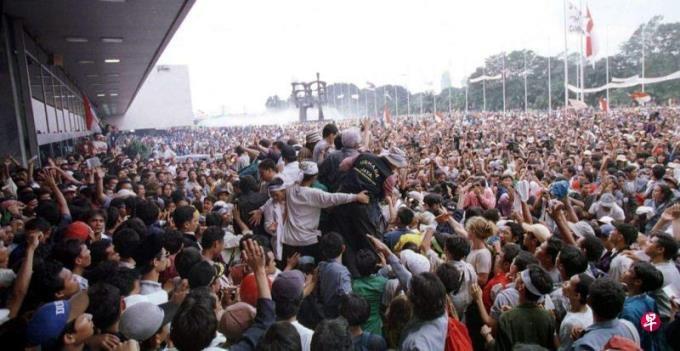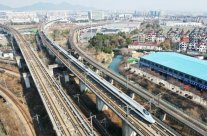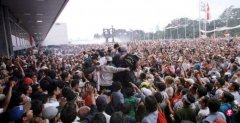
The reform after the atrocities in May 1998 was a "three hearts and two intentions" reform campaign.The new forces appeared, but the old forces were still deeply rooted.Although the soldiers were not as powerful as the forces of the Suhado era, they still played pivotal.Those officers associated with violence, due to insufficient evidence, were still at a high time during the reform period, and even lived high.
In May 26 years ago, anti -Chinese atrocities that shocked the world in Indonesia.This atrocities have not found the black hands behind the scenes so far.Some people began to forget it, and some people still remembered.In fact, it will become the historical memory of Indonesia and the world.
Now reviewing the ins and outs of this anti -Chinese incident is meaningful, because such incidents may be repeated.This incident was the last struggle of Suhado Group in front of Suhado.
The cause of atrocities in May is the historical source.In general, the economic status of Indonesians in the economy is higher than the so -called Indonesian indigenous people, and culture is different from Indonesian indigenous culture.There are cooperation and friction between the Chinese and indigenous peoples, and many indigenous elites have major prejudice to the Chinese.However, whether it is Chinese or indigenous, their ethnic groups are not uniform.At the end of Suhado, the struggle between the political power between indigenous people became more intense, and the gap between the rich and the poor expanded. When the financial turmoil, the people did not talk about their lives.In order to shift the people's sight and point the spearhead to the Chinese, Suhado has led to the rapid spread of dissatisfaction with the Chinese. Various anti -China and Chinese exclusion activities have emerged endlessly to create conditions for the violence in May 1998.
Before the incident, the internal division of the Suhado Group was split, and the anti -China forces looked up.The Suhado family began to launch anti -Chinese actions in a planned manner, attributed the economic crisis to the Chinese, attempted to keep the dangerous regime, and brewed violent incidents in May 1998.Two days on May 13th and 14th, thugs burned the wealth of the Chinese people in Jakarta in the capital Jakarta, and gang rape to kill Chinese women under the day of light.The Chinese Indonesia fled, and some fled abroad, and some migrated to Indonesia's safer areas.
The tragic encounters of Chinese Indonesians have attracted the attention of the world media, and the global Chinese have condemned.Shortly after the atrocities, many reports of reports, news pictures, and even publications of this incident appeared.However, the academic monographs of the ins and outs of this incident in a deeper and systematically analyzed work.Discuss this incident in -depth.Most of my narratives and analysis here are based on Jane Ma's writing.
The violence incidents that year were not limited to Jakarta. Similar incidents occurred in Thoro, but fewer people mentioned that some experts believed that it was more serious than Jakarta.At first, although there were strong anti -Chinese factors, it later evolved into a democratic movement of the Anti -Suhando regime.In order to avoid bloody conflicts, Suhador immediately gave his position to Harbimbi, and since then, the "reform period" in Indonesia's history began.
Find Report of the Truth Committee
President Hibby, the newly on stage, finally organized the "finding the truth committee" under the pressure at home and abroad to calm the attack at home and abroad.This committee is composed of 18 soldiers, officials, and civil rights. It represents different pressure groups, so there are often differences in opinions.Therefore, the content of the report can be said to accommodate the opinions of all parties and has compromise.It reveals some important facts: the violence of May is related to the upper leaders. The model is similar to military operations. 52 Chinese women have been raped, but their motivation is unknown.
The two days when the incident occurred, the police cleared up, and the military and police did not know where to go, which was really puzzling.At that time, General Plabovo, the former strategic deployment commander and former son -in -law of Suhado, and General SjaFrie Sjamsoedin, commander of the Military Region of the Greater Jakarta, must be investigated further in the event.Jane Ma said that the report did not point out the black hands behind the scenes, and of course, he did not show that who should take responsibility.Many questions still have no answer.
However, the report has admitted that this is not a general violent incident.According to Jianma's research, the second day of the riots, the Jakarta Military Department and some key members had held secret meetings, and both Prabowo and Chadling attended.However, they all denied that they had discussed the above issues.But the Chinese society at that time was convinced that Plaboor manipulated behind the scenes.
After the atrocities in May 1998, the demonstration of anti -Suhado continued, Suhando finally stepped down, and the relationship between Chinese and Indonesian indigenous peoples was still tense.In several small cities in Java, Chinese and Indonesian indigenous peoples often cause ethnic conflicts due to small sesame.However, because there were no upper -level people participating, they did not evolve into racial riots.Although Indonesian society has been democratized, the basic structure has not changed, and the relationship between ethnic groups has not improved in nature, so it cannot guarantee that anti -violence in China will not repeat itself.However, it is necessary to point out that during the reform period, the status of Chinese in Indonesia gradually improved, the treatment gradually improved, and the political and society had gained temporary stability. The Chinese received unprecedented legal equal treatment, at least theoretically.
In fact, the reform after the atrocities in May 1998 was a "three hearts and two intentions" reform campaign.The new forces appeared, but the old forces were still deeply rooted.Although the soldiers were not as powerful as the forces of the Suhado era, they still played pivotal.Those officers associated with violence, due to insufficient evidence, were still at a high time during the reform period, and even lived high.
Although the forces of the Suhado family have been weakened, they still stand still.The forces of new reforms began to rise.Zoko represents the power of this new reformist.But later, this old and new forces gradually walked together. Plaboor, who represented the old forces, cooperated with Zoko, representing the reformist. The eldest son of Zoko and Plaboor formed Zheng and Vice President.EssencePlabovo became a heir of Zoko.Few people will believe that Plabovo can represent the reform faction, and many observers believe that this is the restoration of the old forces.
Comparison with the 930 Anti -China incident in 1965
It should be pointed out that since the founding of the Indonesian PRC, two are considered by the outside world to be anti -China atrocities: one is an anti -China incident in 1965, and the other is anti -China atrocities in 1998.These two so -called anti -China incidents are actually different.The latter is "racial conflict". The goal of the nourishing person is the Chinese (especially the Indonesian Chinese).In 1965, the Indonesian Communist Party launched the 930 campaign, accusing the right -wing soldiers planning for power.However, the 930 movement failed, and the soldiers began to counterattack, accusing the India of the Communist Party to seize power, China supported the Communist Party, and a large -scale communist.
In the atrocities in 1998, thugs and hosts behind the scenes did not participate in planning, no anti -China remarks, nor did they attack the Chinese embassy and Chinese -related institutions.Indonesia's real estate and enterprises cannot be spared, and even the ethnic Chinese who are culturally close to "assimilation" and the Chinese people of the Indonesian government have become the object of attack.The important member of the government think tank, Yosov Vani (Lin Mianji), commented after the atrocities of May, and Chinese and Chinese are no longer regarded as a member of the "Indonesian nation".
Since the anti -China atrocities in 1998 were targeted at Chinese, especially Indonesia, not against China, the Chinese government did not protest.The Chinese ambassador to Indonesia in Indonesia in July expressed "concern" to the Habi government and asked the Indonesian government to protect the lives and property of ethnic minorities.At that time, the Beijing government was quite lonelyLi, still has hope for the Suhado regime, and seems to be unwilling to lose Indonesia's support.
However, the anti -China incident in 1965 was different.In this movement, many right -wing Indonesian Chinese participated in the plan. They attacked leftists (including Chinese). At the same time, they accused Beijing from participating in the 1965 incident, so they attacked Beijing Embassy, consulate and Xinhua News Agency.Beijing also stood on the Indian side and condemned the Indonesian military government.Relations between the two countries turned sharply and finally decided in 1967.In 1965, the so -called anti -China incident, it is said that anti -Chinese thugs and soldiers slaughtered hundreds of thousands or even 1 million Indonesians.In fact, the slaughter occurs mainly in rural areas. Villagers are indigenous people in Indonesia.However, Chinese in Indonesia usually live in cities, and there are not many participating in India, so the number of victims is very limited.(Regarding the victims of the Indonesian Holocaust, please see the clumsy text of the United Morning Post · Speech Edition on May 14, 2016.)
The author is a senior visiting professor at the Singapore Yusov Isaf Issa East South Asian Research Institute Nanyang University of Technology Radalon South International Research Institute



